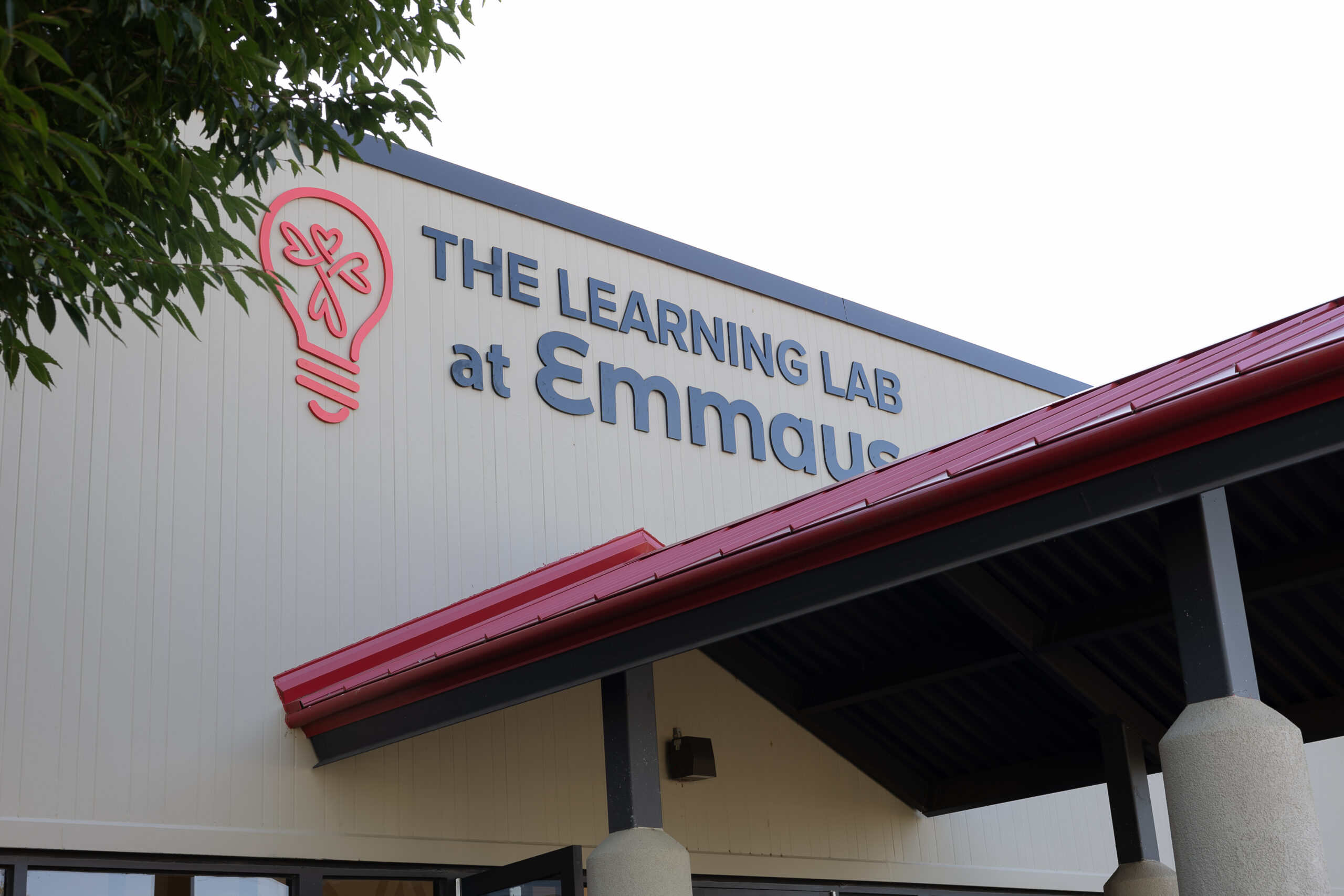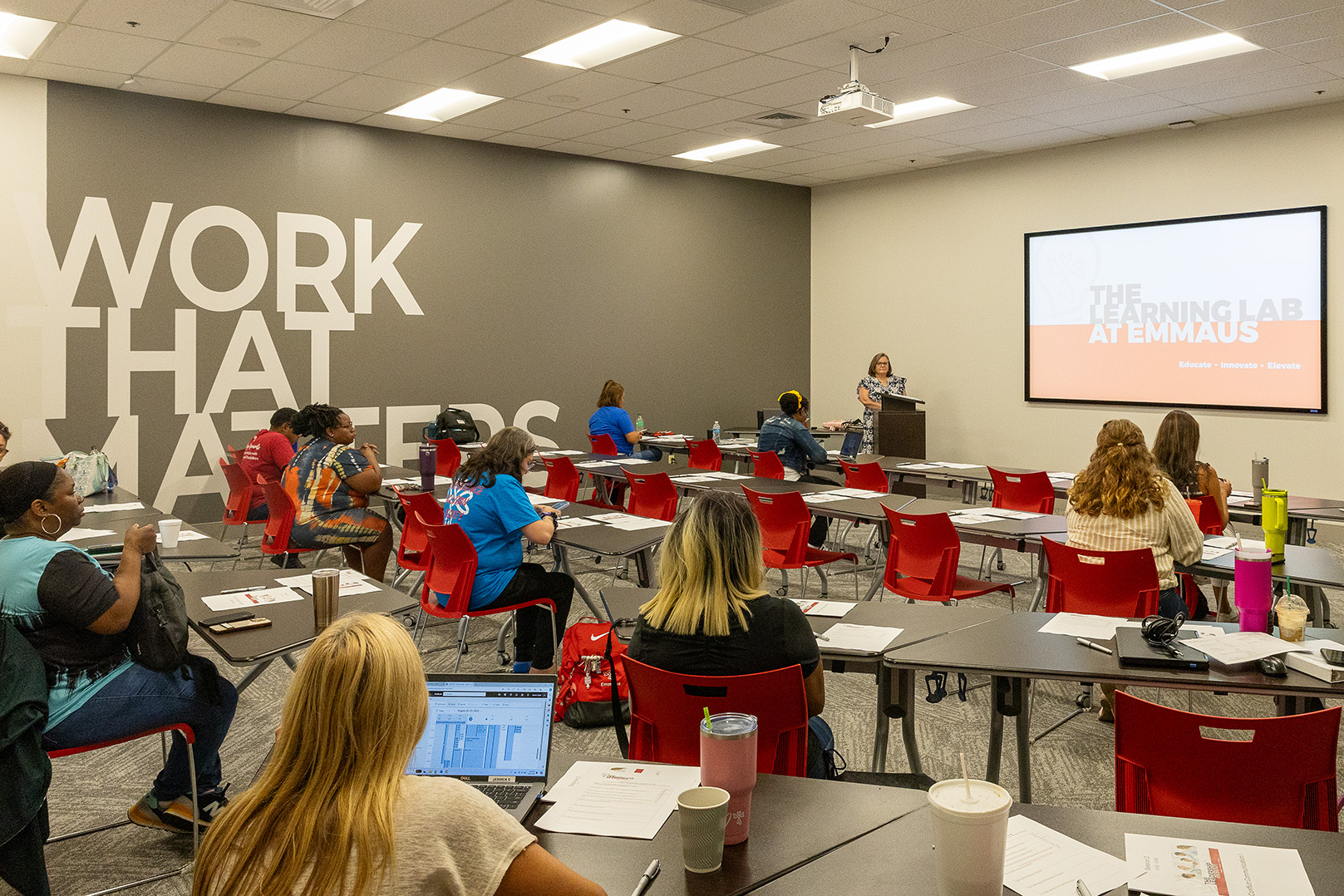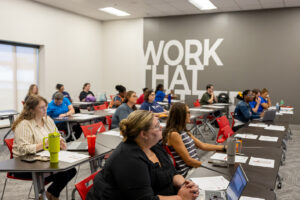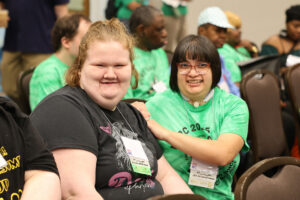 Emmaus is a non-profit organization with a rich 130-year history of supporting adults with developmental disabilities across St. Louis, St. Charles, Warren, and Franklin counties. Rooted in our faith-based mission to empower and enrich the lives of those we serve, our commitment to innovation and adaptation led us to create The Learning Lab at Emmaus.
Emmaus is a non-profit organization with a rich 130-year history of supporting adults with developmental disabilities across St. Louis, St. Charles, Warren, and Franklin counties. Rooted in our faith-based mission to empower and enrich the lives of those we serve, our commitment to innovation and adaptation led us to create The Learning Lab at Emmaus.
Turning Point
In 2020, the COVID-19 pandemic brought unprecedented challenges and changes worldwide. At Emmaus, it necessitated a rapid transition of our administrative employees to work from home. Initially driven by necessity, this shift quickly revealed a remarkable finding: our employees thrived in a remote work environment. The flexibility of working from home boosted team member satisfaction and maintained, and sometimes enhanced, productivity.
Unused Space Challenge
As the pandemic persisted, it became evident that the traditional office model might no longer be necessary for our administrative team. Emmaus leaders found themselves with a significant amount of unused office space at our main office in St. Charles, MO. Faced with the question, “What should we do with all this space?” our leadership team embarked on a mission to reimagine and repurpose it in a way that would further our mission and support our community.
Birth of The Learning Lab
 From this question arose a groundbreaking idea—The Learning Lab at Emmaus. This innovative space was conceptualized as a learning, development, and empowerment hub for our staff and the individuals we serve. The Learning Lab is designed to be a dynamic environment where knowledge, skills, and personal growth are fostered through various programs and resources.
From this question arose a groundbreaking idea—The Learning Lab at Emmaus. This innovative space was conceptualized as a learning, development, and empowerment hub for our staff and the individuals we serve. The Learning Lab is designed to be a dynamic environment where knowledge, skills, and personal growth are fostered through various programs and resources.
Bridging the Gap in Medication Aide Training: The Vision Behind Our Learning Lab
When we first shared the vision for our new Learning Lab, one of the most frequent questions we received from industry professionals was, “Will you offer Level 1 Medication Aide (L1MA) courses?” The demand for L1MA certification is undeniable, especially in Direct Support Professionals (DSP) training, where certification to pass medications is essential. As I spoke with others in the industry, it became clear that many agencies, including ours, faced significant challenges in providing this critical training.
The Need for L1MA Training
For many, DSPs play a vital role in the support of individuals with intellectual and developmental disabilities (IDD). DSPs must be certified to pass medications to ensure safe medication administration, a responsibility that requires specialized training. However, agencies often struggle to offer L1MA courses because the training must be taught by a Licensed Practical Nurse (LPN) or a Registered Nurse (RN). For many organizations, the challenge is not a lack of desire to train their team members but the difficulty in finding RNs or LPNs who are available and able to lead these 16-hour courses.
Nurses in these agencies typically manage large caseloads, leaving little time to teach the necessary courses. Recognizing this gap, we knew from the outset that our learning lab would solve this problem.
Our Dedicated Nursing Staff: A Key to Success
One of the foundational strengths of our learning lab is our team of registered nurses. Unlike other agencies facing staffing constraints, we are fortunate to have two RNs exclusively dedicated to training and education. These nurses combine their extensive healthcare experience with exceptional facilitation skills, a passion for teaching, and a deep understanding of the unique needs of DSPs in the IDD field.
We committed to offering L1MA courses as part of our core curriculum from the beginning. We also plan to provide CPR and First Aid (CPR/FA) courses, further enhancing the skill set of DSPs, who are often the first responders to medical emergencies in their clients’ lives.
The Soft Opening: A Strong Start
We hosted our first L1MA course during our soft opening, and the response was overwhelmingly positive. Three agencies sent DSPs to us for training, all eager to fulfill the certification requirements to support their clients. It was an exciting milestone for us to see our learning lab come to life and to know that we were addressing a pressing need within our community.
What was most rewarding about this experience was not just the successful completion of the course but the feedback we received from participants and agency representatives. They shared how valuable it was to have an accessible, reliable option for L1MA training—one taught by dedicated professionals who understood the challenges DSPs face daily. This kind of feedback reassured us that we were on the right path, and it fueled our commitment to continue providing high-quality training that directly supports the I/DD community.
Filling a Critical Gap in the Industry
Many agencies have faced a significant challenge due to the lack of accessible, qualified L1MA training. By offering this service, we are meeting a need and strengthening the entire ecosystem of support for individuals with intellectual and developmental disabilities. Agencies can now send their staff to our learning lab for certification, confident that the training they receive will be comprehensive and delivered by experts in the field.
But this is just the beginning. Our vision for the learning lab extends beyond L1MA. As we continue to grow, we will explore additional ways to support agencies and DSPs, from offering continuing education opportunities to developing specialized courses tailored to the unique needs of those working in I/DD services. By strategically aligning ourselves as a resource for agencies, we are helping to ensure that Direct Support Professionals have the skills, knowledge, and confidence they need to provide the best support for the clients they serve.
Connect with The Learning Lab at Emmaus
Check out all our courses and how to rent our modern training space at emmaushomes.org/learninglab


